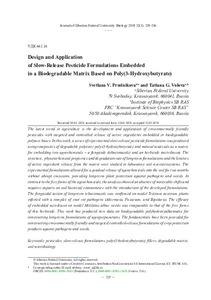Design and Application of Slow-Release Pesticide Formulations Embedded in a Biodegradable Matrix Based on Poly(3-Hydroxybutyrate)
Скачать файл:
URI (для ссылок/цитирований):
https://elib.sfu-kras.ru/handle/2311/125603Автор:
Prudnikova, Svetlana V.
Volova, Tatiana G.
Прудникова, С.В.
Волова, Т.Г.
Дата:
2019-09Журнал:
Журнал Сибирского федерального университета.Биология. Journal of Siberian Federal University. Biology 2019 12 (3)Аннотация:
The latest trend in agriculture is the development and application of environmentally friendly pesticides with targeted and controlled release of active ingredients embedded in biodegradable polymer bases. In this work, a series of experimental slow-release pesticide formulations was produced using composites of degradable polyester poly(3-hydroxybutyrate) and natural materials as a matrix for embedding two agrochemicals – a fungicide (tebuconazole) and an herbicide (metribuzin). The structure, physicochemical properties and degradation rate of long-term formulations and the kinetics of active ingredient release from the matrix were studied in laboratory soil microecosystems. The experimental formulations allowed for a gradual release of agrochemicals into the soil for two months without abrupt emissions, providing long-term plant protection against pathogens and weeds. In contrast to the free forms of the agrochemicals, the analysis showed an absence of noticeable shifts and negative impacts on soil bacterial communities with the introduction of the developed formulations. The fungicidal action of long-term tebuconazole was confirmed on model Triticum aestivum plants infected with a complex of root rot pathogens (Alternaria, Fusarium, and Bipolaris). The efficacy of embedded metribuzin on model Melilotus albus weeds was comparable to that of the free forms of this herbicide. This work has produced new data on biodegradable polyhydroxyalkanoates for constructing long-term formulations of agropreparations. The fundamentals have been provided for constructing environmentally friendly and targeted controlled-release formulations of crop protection products against pathogens and weeds Новейшей тенденцией в сельском хозяйстве является применение экологически чистых пестицидов с целенаправленным и контролируемым высвобождением активных ингредиентов, депонированных в биоразлагаемую основу. В представленной работе описана серия полученных препаратов (фунгицида тебуконазола и гербицида метрибузина) с контролируемым выходом из композитной основы из разлагаемого полимера поли-3-гидроксибутирата и природных материалов. Исследованы структура, физико-химические свойства, скорости разложения основы и выхода действующих веществ в лабораторных почвенных микроэкосистемах. Сформированные составы основы создали условия постепенного выхода препаратов в почву в течение двух месяцев без резких выбросов, обеспечивая долговременную защиту растений от патогенных микроорганизмов и сорняков. Показано отсутствие негативных действий форм на почвенные бактериальные сообщества. Фунгицидное действие тебуконазола подтверждено на модельных растениях Triticum aestivum, зараженных комплексом возбудителей корневых гнилей (Alternalia, Fusarium, Bipolaris). Эффективность депонированного метрибузина была сопоставимой со свободной формой гербицида при исследовании в посевах сорняков Melilotus albus. Работа показала перспективность биоразлагаемых полигидроксиалканоатов для создания долгосрочных форм агропрепаратов с контролируемым выходом действующих веществ с целью защиты культурных растений от патогенных микроорганизмов и сорняков

